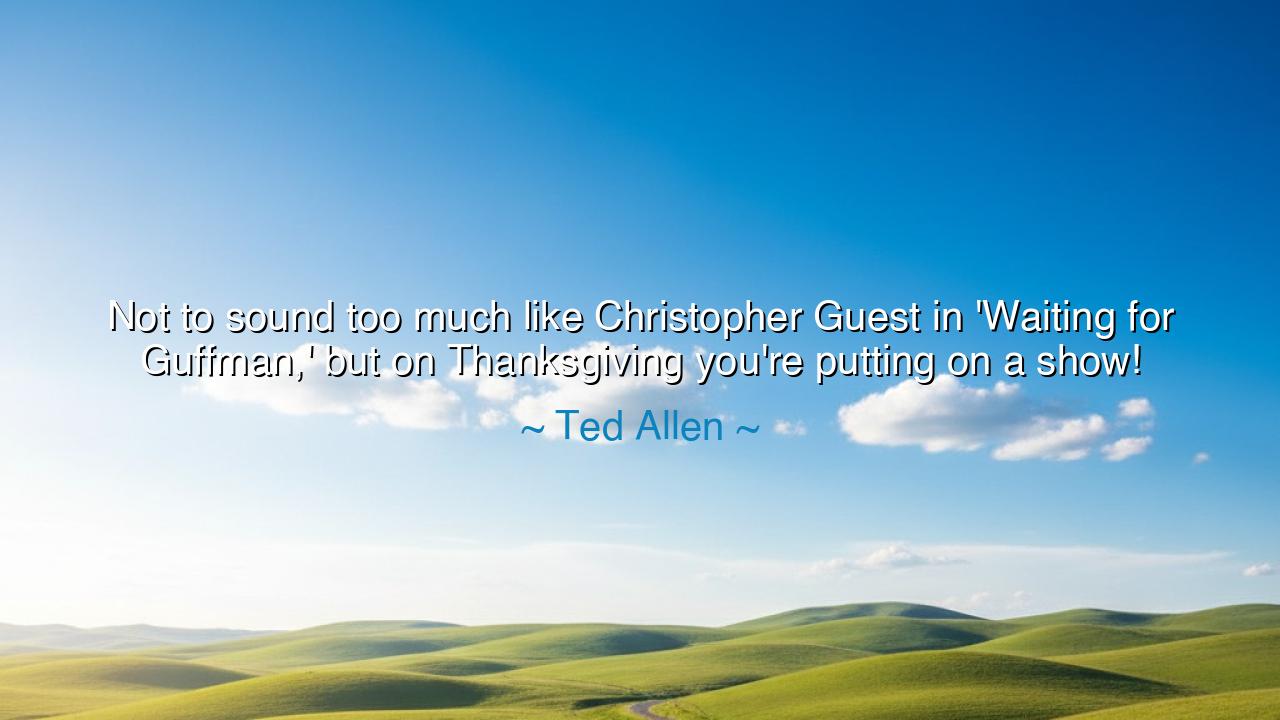
Not to sound too much like Christopher Guest in 'Waiting for
Not to sound too much like Christopher Guest in 'Waiting for Guffman,' but on Thanksgiving you're putting on a show!






Ted Allen once declared with wit and insight: “Not to sound too much like Christopher Guest in Waiting for Guffman, but on Thanksgiving you’re putting on a show!” Though clothed in humor, his words reveal a truth about the nature of gatherings: that every great feast is also a performance, every table a stage, every host an actor in the timeless play of hospitality. Beneath the laughter lies a recognition that holidays are not only meals, but rituals of beauty and order, meant to uplift the spirit of those who partake.
The origin of this quote lies in Allen’s career as a food critic and host, one who has long understood that dining is not only about sustenance but also about presentation, ceremony, and art. By invoking Christopher Guest’s satirical film Waiting for Guffman, Allen pokes fun at the grandiosity of small-town productions. Yet he also acknowledges that, in truth, when we labor over the Thanksgiving table—arranging dishes, setting places, timing the turkey—we too are crafting a performance. And though the audience is small, composed of family and friends, it is an audience that matters more than any theater crowd, for it is bound to us by love.
This understanding is ancient. The Greeks, when they held their symposia, did not simply eat and drink; they arranged the couches, prepared the wine, and orchestrated the evening like a drama, complete with music and poetry. In Rome, the feast was a spectacle, with courses appearing like acts in a play. Even in the humble villages of the Middle Ages, the harvest meal was adorned with song and ritual. Across time, the table has always been a stage where gratitude, abundance, and community are displayed before the watching eyes of kin.
To say that Thanksgiving is a show is not to cheapen it, but to ennoble it. For the show is not empty performance, but a demonstration of love. Each polished plate, each candle lit, each dish carried forth from the oven is a gesture of care. The host, in truth, is both actor and director, choreographing a moment that will linger in memory long after the flavors fade. And just as the best plays are not measured by perfection, but by heart, so too the feast is judged not by flawless turkey but by the joy that fills the room.
Consider the story of Sarah Josepha Hale, the woman who fought to make Thanksgiving a national holiday in the United States. She did not see it as merely a meal, but as a grand civic ritual, a unifying performance that could bind a divided nation. Her campaign succeeded in 1863, when President Lincoln proclaimed Thanksgiving during the Civil War. That proclamation itself was an act of theater—an attempt to set a stage of unity, gratitude, and healing, even amid the nation’s darkest hour. Hale, like Allen, knew that feasts are performances with power to shape hearts and histories.
The lesson here is luminous: embrace the performance of love. Do not scorn the labor of making a meal beautiful, of setting the stage with thought and care. See it instead as a sacred show, a gift of artistry offered to those you cherish. And if you are the guest, honor the effort by receiving it with gratitude, applause not of hands but of heart. The show of Thanksgiving is not about impressing strangers, but about weaving memory, binding families, and declaring through food and ritual: “You are loved. You are worth this effort.”
Therefore, O listener, when the day of Thanksgiving comes, prepare your stage with joy. Do not fear the role of performer, for every host is also an artist, every meal a play, every table a theater of love. And when the curtain falls, when the leftovers are stored and the candles fade, know this: the show you gave will echo in memory long after, a story retold not in reviews, but in the hearts of those who sat at your table. This is the wisdom Ted Allen reveals—that in giving your best, you turn a meal into a masterpiece, and a holiday into a legend.






AAdministratorAdministrator
Welcome, honored guests. Please leave a comment, we will respond soon